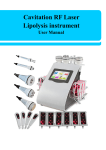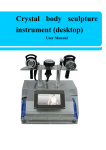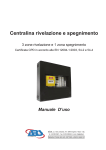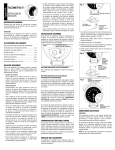Download Service Manual - Whaley Food Service
Transcript
08/2010 HSG Panini Service manual Service Manual GB 2 (50mm) 7,5 (190mm) 130 mm 2 (50mm) This document is to be used in conjunction with the original manufacturer’s manual. The symbols correspond with the numbered drawings of the original manual GB 07/2009 Service Manual Index Short explanation of the appliance List of required instruments for maintenance & repair Check list for each intervention on the machine Troubleshooting Error codes How to enter the Program mode Explanation on software settings (logigram) Settings table Parameters Repair section Exploded View 1 4 4 5 6 6 7 8 10 20 A 1. Explanation of the appliance 1-1 IMPORTANT SAFETY INSTRUCTIONS Carefully read this booklet as it gives important information concerning safe maintenance. Install or locate this appliance only in accordance with the provided installation instructions The following terms given in the service manual indicate a potentially hazardous condition for the operator, service personnel or for the appliance. • Danger! This term warns of an immediate danger that could lead to considerable damage or death. • Warning! This term indicates the potential risk of considerable damage or death following improper use or service of the appliance. • Important! This term indicates information that must be thoroughly understood, although not indicating danger. Warning! Danger of fire. For your safety, do not keep gasoline or other flammable liquid or gaseous materials in the vicinity of this or other appliances. Keep the area around the appliance clear and free of combustibles. Do not use this appliance in an explosive atmosphere. Warning! Only install the appliance in a well-ventilated place. Inadequate ventilation causes asphyxia. Do not obstruct the ventilation system of the place where the appliance is installed. Do not obstruct the vent holes located at the sides and back of this appliance. Important! Appliance installation and any maintenance work must be carried out only by specialized personnel authorized by the manufacturer. Install or locate this appliance in a well-lit place. • Place emergency telephone numbers in a visible position. • For assistance, contact an authorized technical centre. Demand original spare parts. • This appliance is designed for cooking food. It is intended for industrial use. Any other use is to be considered improper • The appliance can’t be used by handicapped people or children but only by responsible and trained operators. • Do not leave the appliance unattended when operating. • Unplug the appliance in case of a fault or poor operation. • Do not use products (even if diluted) containing chlorine (sodium hypochlorite, hydrochloric or muriatic acid, etc.) to clean the appliance. Do not use metal tools to clean steel parts or the glass surface (wire brushes or Scotch Brite type scouring pads). • Do not allow dirt, fat, food or other residue to form deposits on the appliance. • Do not wash the appliance with direct jets of water. Failure to observe the above can compromise the safety of the appliance. Failure to observe the above invalidates the warranty. HSPP tech GB 03 09 1/38 WARNING TO REDUCE THE RISK OF BURNS, ELECTRIC SHOCK, FIRE, INJURY TO PERSONS, OR EXPOSURE TO EXCESSIVE MICROWAVE ENERGY: 1) Do not use the appliance empty 2) Read and follow the specific «PRECAUTIONS TO AVOID POSSIBLE EXPOSURE TO EXCESSIVE MICROWAVE ENERGY» found in chapter 3 of the user manual 3) This appliance must be grounded. Connect only to properly grounded outlet. See «GROUNDING INSTRUCTIONS» found on chapter 2-9 of the user manual 4) Install or locate this appliance only in accordance with the provided installation instructions 5) Some products such as whole eggs and sealed containers - for example, closed glass jars - are able to explode and could not be heated in this appliance. 6) Use this appliance only for its intended use as described in the user manual. Do not use corrosive chemicals or vapours in this appliance. This type of appliance is specifically designed to heat or cook FOOD. It is not designed for laboratory use. 7) As with any professional appliance, it can not be used by handicapped people or children. 8) Do not operate this appliance if it has a damaged cord or plug, if it is not working properly, or if it has been damaged or dropped. 9) This appliance should be serviced only by qualified service personnel. Contact nearest authorized service facility for examination, repair, or adjustment. 10) Do not cover or block any openings on the appliance. 11) Do not store this appliance outdoors. Do not use this product near water - for example, near a kitchen sink, in a wet basement, near a swimming pool, or similar locations. 12) Do not immerse the appliance, the upper heating plate, cord or plug in water. 13) Keep cord away from heated surfaces. 14) Do not let the cord hang over the edge of a table or counter. 16) To reduce the risk of fire in the heating cavity: I) Do not overcook food. DO NOT place plastic, or other combustible materials, cooking utensils or other item in all materials it could be inside the appliance. ONLY FOOD, with the designated specific baking paper. II) If materials inside the appliance ignite, turn appliance off, and disconnect the power cord. III) Do not leave things on the glass, do not use the cooking chamber for storage purposes. Do not leave paper products, cooking utensils, or food in the cavity when not in use. IV) Do not put metallic recipient or any kind of kitchenware, tools. V) Clean regularly the glass and the upper heating plate. Carbon deposit could overheat the food. 18) The maximum height of the food to be cooked must not overpass 3’’/75mm. 19) In use and after use the appliance risks to have hot surfaces, be aware of touching the appliances (especially all the lid and its heating plate, the glass…). 20) As in any Microwave appliance, it can occur to have sparks inside the cooking chamber. These sparks do not influence the safety of the user nor the appliance nor the quality of the food. If, as a consequence of the sparking, a dark mark on the metal parts is visible, this can be cleaned with a damp cloth. SAVE THESE INSTRUCTIONS CAREFULLY FOR FURTHER CONSULTATION BY THE VARIOUS OPERATORS HSPP tech GB 03 09 2/38 PRECAUTIONS TO BE OBSERVED BEFORE AND DURING SERVICING TO AVOID POSSIBLE EXPOSURE TO EXCESSIVE MICROWAVE ENERGY (a) Do not operate or allow the appliance to be operated with the lid open. (b) Make the following safety checks on all appliances to be serviced before activating the magnetron or other microwave source, and make repairs as necessary: (1) interlock operation, (2) proper lid closing, (3),contact surfaces (arcing, wear, and other damage), (4) damage to or loosening of hinges and latches, (5) evidence of dropping or abuse. (c) Before turning on microwave power for any service test or inspection within the microwave generating compartments, check the magnetron, wave guide or transmission line, and cavity for proper alignment, integrity, and connection. (d) Any defective or misadjusted components in the interlock, user interface, contact surfaces, and microwave generation and transmission systems shall be repaired, replaced, or adjusted by procedures described in this manual before the appliance is released to the owner (e) A microwave leakage check to verify compliance with the standards should be performed on each appliance prior to release to the owner. HSPP tech GB 03 09 3/38 1-2 EXPLANATION OF THE APPLIANCE: The appliance is a product specifically designed for Hot Sandwich Outlets, with the following main characteristics: • Great tasting, hot, toasted Sandwich in about less than 60” (depending on the sandwich), in a one-step-solution; • Combining the quality of latest Panini Grill technology with the speed of Micro-Wave Technology; • The HSG has been designed to be installed in many different kinds of environment, even outside a real professional kitchen or when the cooking activity is done in front of the customers (or at least in the same room); 1-3 PICTURE OF THE APPLIANCE 2. List of required equipment for maintenance & repair The following instruments and tools must be available for servicing the appliance additionally to the regular equipment: - MW leakage detector suitable for UL requirements (sensibility 0.1mW/cm2).=> 0D6887 - Multimeter => 0S0479 - Torx screw drivers sizes 18, 20 and 25. - Surface contact temperature probe (min 300°C/572F). In case of repair the following materials may be necessary: - Conductive paste (for min 280 °C) => 049196 (100gr) - Silicone RTV 102 color white. => 0D6886 - Silicone RTV 108 color transparent. => 0D1250 - Acetona. - Glue: Loctite (Strong version). - Test load for MW leakage: 1 quart/1 liter of tap water in a high temperature and MW proof container . (Note the height of the container cannot be more than 3”/75mm). - Specific Glass cutting device. => 0D6888 - Cutter. - Tool for smoothening a silicon rod. - Positioning Jig ( only on demand for Authorized Repair Centres). 3.Check list for each intervention on the appliances Important! Appliance installation and any maintenance work must be carried out only by specialized personnel authorized by the manufacturer. Microwave leakage must be checked every time you do service to the machine. For the safe and efficient use of the appliance it is recommended to check at each intervention the following issues. - General integrity and cleanliness of the appliance - Microwave leakage - Right Functioning of the appliance The following check list can be used also as guideline for every preventive maintenance. Please refer to the after sales dealer policy for more information. General integrity and cleanliness Unplug the appliance! Verify that the machine is cooled down! As in any Microwave appliance, it can occur to have sparks inside the cooking chamber. These sparks do not influence the safety of the user nor the safety of the appliance nor the quality of the food. If, as a consequence of the sparking, a dark mark on the metal parts is visible, this can be cleaned with a damp cloth. If it is necessary to train the user on the cleaning, refer to the cleaning instructions on pages 3 and 4 and chapter 5 in this handbook. a) Check the location (see installation diagram in page 15) - Distances to other machines, walls and combustible parts - Obstacles for the opening and closing action - Obstacles on vent holes of the appliance - Overall cleanliness of the surroundings of the appliance - Check the used tools for cleaning . If not OK, advise the user. HSPP tech GB 03 09 4/38 b) Check the mechanical condition of the appliance Glass: - Cracks of the glass. - State of the silicone sealing around the glass. - Good position of the insulating parts inside the launching chamber. - Check the glass for heavy dirt. Upper heating plate: - Smooth movement of the upper heating plate, no noise. - Easy removal of the upper heating plate. - Check the presence and tightness of the screws of the cover of the upper heating plate. - Check the state of the upper plate cable and the tightness of the connector to the column of the upper heating plate. - Cleanliness of the upper cooking chamber. - Easy plug-in of the upper heating plate with easily locking it - Cleanliness of the upper heating plate, especially carbon deposits and damages of the coating. Upper lid: - Easy closing and opening of the lid, no noise and no unusual forces. - Open the front cover and check the cleanliness of the steam evacuation chamber. Remove all particles stuck the grid. Handle: - Easy movement of the handle. Limiter screw must be in place. - Easy movement of the 2 pins in the handle and its automatic repositioning. - Check the tightness of the 2 pin blockers. - Easy movement of the electromagnet washer. - Cleanliness of electromagnet washer. Front of the appliance: - Cleanliness of the electromagnet. - Good and tight position of the flat panel (membrane). - Check for a big gap between front panel and electro magnet support. - Repair or renew the parts, if necessary. Sides of the appliance - No blocking of the ventilation holes. Back of the appliance. - No blocking of the exhaust holes. - Check the silicone sealing on the top of the tilting box. Cable connections (unplugged). - Check the main power supply cord concerning damages, burnings etc. Microwave leakage Go to this test only if the above described “General integrity and cleanliness” test was passed! Prepare and switch on your Microwave Detector (see “List of required instruments for maintenance & repair” in chapter 2 of this manual). Press the two outer program buttons in the same time you plug in the machine until that you see P1 on the display. (This testing mode give the possibility to start the microwave cycle without waiting the end of the preheating mode). Put the specified load (see for maintenance & repair” in onto the glass and close the lid. “List of required instruments chapter 2 of this manual) Start the leakage test immediately (the detector probe must be at 5cm from the tested part perpendicular to it, verify the position of your probe inside the detector): - In front of the appliance horizontally along the gap between lid and front panel. - On both sides of the appliance horizontally along the gap between lid and lateral covers. - On the back of the appliance horizontally along the gap between lid and tilting box. - On the top of the appliance all around the column and the upper plate cable. - Inside the steam evacuation chamber (front cover removed!) Warning: If the limit of 1.0 mW/cm² or 60V/m in the North America and 5,0 mW/cm2 or 300V/m in Europe is exceeded for more than 3sec at the same position, the appliance has a microwave leakage and has to be stopped immediately. (see ” Repair section” in chapter 5 of this manual). Functioning of the appliance As the appliance is still in the testing mode and might have not the right temperature, the appliance has to be switched off and disconnected from the power supply. The functioning test has to be executed as follows: Connection to power supply. - Verify the version of the User Interface. Switch on and preheating - Switch on the appliance. - Check the temperatures on the glass and on the upper heating plate. - Try to push the program buttons (they should not be operational during preheating). During operation mode - Start a cycle with the defined load. - Check correct lid latching. - Check automatic lid opening. - Check cooking results (grilling of top and bottom as well as core temperature in accordance with the chosen program if using real load. - Check all other programs. For all findings please refer to the “troubleshooting” or the “repair section” in chapter 4 resp. 5 in this manual. 4. HSG troubleshooting For a fast and efficient, but also safe elimination of a potential problem with the appliance, the trained service personnel can use the following troubleshooting guide. See the important safety information in Chapter 1 of this service manual before any intervention on the appliance. The troubleshooting guide has been set up in such a way that the real cause behind the problem identified can be found by going through the troubleshooting guide step by step from the beginning. Important! Appliance installation and any maintenance work must be carried out only by specialized personnel authorized by the manufacturer. Microwave leakage must be checked every time you do service to the machine. HSPP tech GB 03 09 5/38 Error codes ERROR CODES DESIGNATION Err 1 Bottom probe Err 2 Top probe Err 3 Overheating HV transformer Err 4 Front magnetron circuit problem Err 5 Rear magnetron circuit problem Err 6 Both magnetrons circuit problem How to enter the Program mode Unplug the machine. Plug the machine and simultaneously press buttons 2 and 3 to enter the program mode. ( BASI for EU model and PRO for US model ) See the program mode diagram for the details. List of settings : Temp: temperature in C° or F°. trt : temperature of the upper heating plate trb : temperature of the bottom plate tCYx: times corresponding to cycle x (1 2 3/4 S) tt : total time of the cycle tw: time of micro wave during the cycle Action on buttons : A: enter in the setting B: decrease the value of the setting C: increase the value of the setting D: skip to the following parameter HSPP tech GB 09 09 6/38 Explanation on software settings EU Version (U207) 7/38 Explanation on software settings US Version (U202-U208) 8/38 Settings Table For US Version U202 Since 09061 - Until 09122 Parameters Range Default Duty t1 t2 10s - 60s 1s - 30s 30 12 MF Stby t3 t4 t5 t6 0s - 30 s 5 min - 60 min 1 min - 10 min 10s - 3 min 10 60 240 60 Temp trt trb Tcy1 tt Tw 1s - 5 min 0s - 5 min 45 45 Tcy2 tt tW 1s - 5 min 0s - 5 min 60 52 Tcy3 tt tW 1s - 5 min 0s - 5 min 90 75 Tcy4 tt tW 1s - 5 min 0s - 5 min 30 20 New Parameters 150°C - 250 °C / 300°F - 482°F 240°C / 464°F 150°C - 280°C / 300°F - 536°F 246°C / 475°F Settings Table For US Version U208 Since 09061 Parameters Range Default Duty t1 t2 10s - 60s 1s - 30s 30 12 MF t3 t4 t5 t6 trt trb tt Tw tt tW tt tW tt tW Stby Temp Tcy1 Tcy2 Tcy3 Tcy4 0s - 30 s 0 5 min - 60 min 60 1 min - 10 min 240 10s - 3 min 60 150°C - 250 °C / 300°F - 482°F 240°C / 464°F 150°C - 280°C / 300°F - 536°F 233°C / 451°F 1s - 5 min 45 0s - 5 min 45 1s - 5 min 60 0s - 5 min 52 1s - 5 min 90 0s - 5 min 75 1s - 5 min 30 0s - 5 min 20 9/38 New Parameters Settings Table For EU Version U206 Since 09131 - Until 09191 Parameters Range Default New Parameters Duty t1 t2 10s - 60s 1s - 30s 30 12 MF Stby t3 t4 t5 t6 0s - 30 s 5 min - 60 min 1 min - 10 min 10s - 3 min 10 60 240 60 Temp trt trb 150°C - 250 °C / 300°F - 482°F 150°C - 280°C / 300°F - 536°F 250 230 Tcy1 tt Tw 1s - 5 min 0s - 5 min 30 20 Tcy2 tt tW 1s - 5 min 0s - 5 min 40 30 Tcy3 tt tW 1s - 5 min 0s - 5 min 50 40 Tcy4 tt tW 1s - 5 min 0s - 5 min 59 0 Settings Table For EU Version U207 Since 09131 Parameters Range Duty t1 t2 10s - 60s 1s - 30s 30 12 MF t3 t4 t5 t6 trt trb tt Tw tt tW tt tW tt tW 0s - 30 s 5 min - 60 min 1 min - 10 min 10s - 3 min 150°C - 250 °C / 300°F - 482°F 150°C - 280°C / 300°F - 536°F 1s - 5 min 0s - 5 min 1s - 5 min 0s - 5 min 1s - 5 min 0s - 5 min 1s - 5 min 0s - 5 min 10 60 240 60 250 230 30 20 40 30 50 40 59 0 Stby Temp Tcy1 Tcy2 Tcy3 Tcy4 Default New Parameters Comments : The modification between U206 and U207 concern only the display for the Program 4. PS is now replace by P4 10/38 Parameters details HSG Panini DUTY Regulation of the temperature of the bottom plate except during standard cycle (a cooking program is selected, the display shows Px, the upper lid is open, the machine is not in Std By). The temperature regulation is not in this cycle managed by probe but by time (on/off). The Upper Plate T˚ is regulated by a probe. info Î the maxi temperature of cut of the probe is 250˚C. T1 Total time of a period in the duty cycle (in seconds). T2 Time where the resistance of the bottom plate is switched on during the period T1 (in seconds). T2 = 12 with T1 = 30 ÎT˚ bottom ≈ 250˚C / 482 F T2 = 11 with T1 = 30 ÎT˚ bottom ≈ 235˚C / 455 F T2 = 10 with T1 = 30 ÎT˚ bottom ≈ 220˚C / 428 F Duty cycle chronogram : on Management of the temperature of the bottom plate except during the cooking cycle or Std By mode Î off T2 T1 M.F. Forcing time Time at the beginning of each cooking cycle during which the resistance of the bottom plate is in forced on time to decrease the impact of the temperature drop of the glass because of a panino being placed on it. CUSTOMER SUPPORT - 2009/06 If too much high, risk of dark bottom of the panino. T3 Time of forcing time (in seconds). 1 11/38 Std By Energy save mode Mode in which the machine can be set to decrease the electrical consumption. In this mode, the ernergy save mode is made by a control of temperature by time on/off of the lower resistance T4 Time before Std By (in minutes) T5 Total time of a Std By period (in minutes) T6 Time where the bottom plate resistance is switched on during T5 (in minutes). Std By cycle chronogram : on off Tcy Standard cooking cycle Tcy T4 Time before Stby cooking cycle T4 OMER SUPPORT - 2009/06 Temp Temperature regulation of the lower and upper resistances Trt Temperature regulation of the resistance and the upper plate Trb Temperature regulation of the resistance and the lower plate 12/38 T6 T6 T5 T5 Tcy 1/2/3/4 Cooking cycle time regulation 1 - 2 - 3 and 4 Tt Total time of the cycle in seconds Tw Microwaves time during the cycle total time Tcy cycle chronogram : on resistance + mw off mw off resistance Tw OMER SUPPORT - 2009/06 Tt 13/38 Problem Check if … The unit doesn’t power up Yes no LED light on beside the ON/OFF switch button No No Yes: Check ... plug is inside the socket plug in circuit breaker is on re-engage voltage arrives to the outlet problem not related to the unit voltage arrives to the terminal block : US version: 208V between L and N CE version: 400V between all phases and 230V between L3 and N on the filter replace the cable and cord wires are hooked in the terminal block fix the wires following the electrical diagram voltage is coming into the PCB with a voltmeter : 208V between 121 and 122 on the connector 12 on the board - CE version : 230V between 121 and 122 on the connector 12 on the board reconnect or replace the cable if damaged the LED doesn’t work replace the board no initial display of “init” and “UIxx” The unit doesn’t go in preheating Yes replace the board Yes: Check ... membrane is in place and not damaged change the membrane button is not damaged change board position between the board and the membrane is OK reposition the board or the membrane No preheating mode indication in the display KM1 is working by visually checking if the indicator moves from the initial position and the power coming in reconnect the wires or replace the contactor Indicates Error Codes Err1 the bottom probe is well connected reconnect the probe The value of the resistance of the probe is approximately 1,1KOhm at room temperature (1,074 Kohm at 25°C/77°F) replace the probe the top probe is well connected reconnect the probe the wiring extension of the top plate probe is well connected reconnect the wires The value of the resistance of the probe is approximately 1,1KOhm at room temperature (1,074 Kohm at 25°C/77°F) replace the probe On/off button is blocked (no «click») No No Indicates Error Codes Err2 Yes The unit never reaches operating mode If not, action to do Yes: Check ... The top plate temperature is not reaching the temperature setting No cabling of the upper plate to the terminal block, is connected , check also connection between terminal block and power board => connector 5 on position 5 on the board + continutity test between terminal block and board the probe connector SUP is connected in position SUP on the board ( lumberg black connector). HSPP tech GB 03 09 14/38 connect the wires in the good position on terminal block and on the board. connect the connector SUP on the board Problem No No The bottom plate temperature is not reaching the temperature setting The lid doesn’t latch Yes Check if … If not, action to do the top heating element is absorbing current with the Multimeter (approx. 4amps) replace the upper plate kit cabling between terminal block and the board (connector 5) is connected connect the wires the board is not giving power to the heating elements through the relay (voltmeter in connector 5 of the board, 208 V - 230V for CE version) replace the board cabling of the bottom plate to the board, connector 4 is connected on position 4 on the power board. connect the wires the probe connector INF is connected in position INF on the board ( lumberg black connector. Connect the connector INF on the board the bottom heating element is absorbing current with the Multimeter (approx. 4amps) replace the heating element of the bottom plate the board is not giving power to the heating elements through the relay (voltmeter in connector 4 of the board) replace the board Yes: Check ... The lid never latch No No the lid doesn’t latch after some cycles but restart to latch after a while the handle reaches the right position to the electromagnet remove all obstacles and/or check for mechanical frictions the electromagnet and/or the washer are dirty make a proper cleaning if the handle magnets are in place replace the handle the handle pins are blocked try to unblock or replace the handle screw of the washer is tight readjust the latching system cables of the electromagnet and magnetic detectors are connected (Connector 10) connect the wires electromagnet is working by a continuity test from the connector 10 change the electromagnet from connector 10 there is nominal voltage when closing the lid replace the board if the power supply is suitable magnetic detectors are working by a continuity test from the connectors 14/15 (by closing the lid) readjust or change the magnetic detectors the bimetallic sensors (CLK1 and CLK2) are working by a continuity test from the pins of the connector 3 (from the two left and the two right contacts) change the bimetallic sensor failed KS1 is working by visually checking if the indicator move from the initial position and the power coming in reconnect the wires or replace the contactor there is enough free clearance for the airflow from the exhaust pipes in the rear of the machine give the clearance according to the installation diagram 15/38 HSPP tech GB 03 09 Problem No The lid doesn’t open automatically at the end of the cycle No Check if … If not, action to do there is an airflow from the exhaust pipes in the rear of the machine reconnect the exhaust pipes to the exhaust pipes support or remove possible clogging obstacles inside the pipes the fan cabling is connected reconnect the wires of the fan there is power supply on both magnetron fans (connector 7 on the board - from the two left and the two right contacts) replace the board the magnetron fans are working with an ohmmeter replace the broken fan Yes: Check ... Yes the handle is moving No there is free movement by verifying: - the opening of the lid - no friction between lid and working top assure free movement the handle pins are pushing out try to unblock or replace the handle lid springs are lifting the lid adjust the spring tension or replace them if broken there is free movement between handle and the lid assure free movement electromagnet is releasing the handle at the end of the cycle replace the board No the handle is blocked Panino doesn’t reach the desired core temperature Yes Yes: Check ... No Error codes No No Indicates Error Codes Err4 or Err5 Indicates Error Codes Err6 the right program was chosen use the right one the programs have the right parameters set the right parameters high voltage wiring from the secondary of transformer are well connected and not damaged reconnect them or replace if damaged the magnetron fuses are working replace them capacitors are undamaged replace it diode and resistor are undamaged replace them Result: Magnetron is broken replace following the error code The voltage to inlet is at least 1956V for 208V machine and 367V for a 400V machine. problem not related to the unit the three phases are correctly connected in the main plug. ( for EU machines ) Connect the wires to have three phases + neutral. If the fuse FS of the board is OK. replace the fuse FS with the spare part fuse on the board and before restart the machine check the adjsutment of Microswicth S3. => Follow the process indicated in the repair section screw of the washer is tight readjust the latching system if the handle magnets are in place replace the handle HSPP tech GB 03 09 16/38 Problem Panino is not grilled on the bottom as desired Check if … If not, action to do magnetic detectors are working by a continuity test from the connectors 14/15 (by closing the lid) readjust or change the magnetic detectors KS2 is working by visually checking the light on when starting a cycle reconnect the wires or replace the static relay switch breaker of the primary transformer is on reactivate it if both magnetrons are working like described in Err4or5 proceed like described under Err4or5 Yes Yes: Check ... Panini has no marks on the bottom No No Panini is overcooked on the bottom Panino is not grill on the top as desired Yes The bottom resistor is working («orange color») proceed the programs have the right parameters set the right parameters see the brief cooking result trouble shooting the resistor wiring is connected and not damaged reconnect or replace if damaged The value of the resistance of the probe is approximately 1,1KOhm at room temperature (1,074 Kohm at 25°C/77°F) replace the probe the board contact of connector 4 are supplying the right voltage : 208V for US version and 230V for CE version replace the board the probe is well in contact with the glass recondition/deblock the spring system that hold the temperature probe the bottom surface is cleaned (no carbon deposits) clean it the right program was chosen use the right one see the brief cooking result trouble shooting the programs have the right parameters set the right parameters The value of the resistance of the probe is approximately 1,1KOhm at room temperature (1,074 Kohm at 25°C/77°F) replace the probe Yes: Check ... The Panino has no marks on the top No No the upper plate can adjust to the Panino automatically (free movement) deblock the upper plate by cleaning and/or repairing The upper plate is working (measure temperature) proceed the programs have the right parameters concerning temperature set the right parameters see the brief cooking result trouble shooting HSPP tech GB 03 09 17/38 Problem Check if … If not, action to do the resistor wiring 51 and 52 is connected and not damaged (resistor to terminal block and terminal block to board) reconnect or replace if damaged The value of the resistance of the probe is approximately 1,1KOhm at room temperature (1,074 Kohm at 25°C/77°F) replace the probe the top heating element is absorbing current with the Multimeter (approx. 4amps) replace it the board is providing the right voltage : 208V for US version and 230V for CE version replace it Panini is overcooked on the top the top surface is cleaned (no clean it carbon deposits) Panino sticks to the upper plate No Yes the programs have the right parameters set the right parameters see the brief cooking result trouble shooting The value of the resistance of the probe is approximately 1,1KOhm at room temperature (1,074 Kohm at 25°C/77°F) replace the probe The Panino is partially or completely sticking to the upper the upper plate or the used baking paper is clean plate Yes clean it the upper plate or the used baking paper is damaged replace the baking paper or if necessary the total upper plate kit the programs have the right parameters (T<250°C) set the right parameters see the brief cooking result trouble shooting the load (Panino) is appropriate to the HSG avoid this type of load Yes: Check ... The Panino too much pressed No No The upper plate is not removable for cleaning use the right one Yes: Check ... No The panino is too much pressed the right program was chosen the upper plate can adjust to the Panino automatically (free movement) deblock the upper plate by cleaning and/or repairing the Panino was placed correctly in the work zone train the user the programs have the right parameters (time of MW) set the right parameters the load (Panino) is appropriate to the HSG avoid this type of load Yes Yes: Check ... Upper plate not releasable No No the release pin is blocked, so no pushing possible unblock the release pin the release pin can not be pushed enough to release the plate readjust or replace the release system HSPP tech GB 03 09 18/38 Problem Check if … Upper plate releasable, but not there are obstacles for a free removable completely from the movement cooking chamber the upper plate cable is free to enter into the cooking chamber The panino is soggy and/or too much condensation around the working top If not, action to do deblock the upper plate by cleaning and/or repairing deblock it or help manually to enter Yes Yes: Check ... Soggy or condensation No Visible mechanical damage No the steam outlet is free deblock or clean it the programs have the right parameters set the right parameters the load (Panino) is appropriate to the HSG avoid this type of load Yes Damages on the external parts of the lid No the ventilation grid in the front of clean it the lid is not clogged Yes: Check ... the damage does not influence MW leakage and mechanically the use of the machine (free movement of the upper plate, of the handle, upper plate cable etc.) Repair or change the incriminated parts. choke cover pins are all in place add the missing ones sealing of the choke cover is in good condition reseal where needed choke cover is in place and without damages Replace the choke cover. Verify the choke for bendings/ damages.Readjust the strips of the chokes. If not possible replace the total lid. all the surroundings of the choke cover are without damage check for microwave leakage or mechanical influences. Repair or replace the lid if necessary Damages on the working top the working top is without damage check for MW leakage or mechanical influences. Repair or replace the working top if necessary Damages of the glass the silicone rod is not damaged or/and there is moisture below the glass replace the silicone the glass is without damage or scratches replace the glass the coating is not damaged replace the total upper plate kit upper plate cover is in place and/or damaged fix it or change if necessary No Damages on the internal parts of the lid (choke cover, choke, flat surfaces) Damages of the upper plate Damages on the external parts of the body front panel and/or membrane replace the membrane or are correctly in place (no change the total front panel if possible water reaching internal necessary parts of the machine HSPP tech GB 03 09 19/38 Problem Abnormal noise Yes No Noise during opening/closing the lid Noise permanent when machine is on Check if … If not, action to do louvers are not clogged or deformed clean or change the part if necessary Yes: Check ... lid springs don’t make noise in movement put some grease or cooking oil transformer fan is free rotating remove the obstacles, readjust the position of the fan or replace it if broken magnetron fans are free rotating remove the obstacles, readjust the position of the fan or replace it if broken The machine goes in preheating/cooling frequently No Yes Yes: Check ... the phenomenon raises after a stdby mode or switching on of the machine the phenomenon raises suddently during operation the unit also displays err3 Automatic lid opening doesn’t work properly No adjust it there is enough free clearance on the lateral sides for the cooling airflow give the clearance according to the installation diagram there is an air sucktion flow on the right lateral side clean the louvers the fan is working reconnect the wires of the fan or replace the fan there is enough free clearance on the lateral sides for the cooling airflow give the clearance according to the installation diagram there is an air sucktion flow on the right lateral side clean the louvers Yes lid doesn’t arrive or stay in full open position lid opens too fast Error 4 or 5 is indicated, but the Panino reaches the desired core temperature the the stdby parameter is according customer expectation Yes: Check ... the lid has a free movement remove the obstacle springs are both in place and not broken and well adjusted adjust or replace them gas spring is in place adjust or replace it spring support is not broken replace it axis is not broken and not deformed replace it tube is not broken and not deformed replace it the bushings are not broken and are in place adjust or replace it screws of the tube axis are tighted tighten them springs are both well adjusted adjust them by having a pretension enough to lift the lid of 19cm on the front without the gas spring working the amperometric transformer is replace it working by measuring the Voltage on connector TM (approx. 3V) HSPP tech GB 03 09 20/38 4-1 COOKING RESULT TROUBLE SHOOTING QUALITY COOKING OF THE SANDWICH If the sandwich is not enough or to much cooked try another program. If there is no adequate program follow the trouble shooting here above: FINDINGS WHAT TO DO The core temperature of the sandwich is too cold - Increase the time of microwave (tw) - If the time of microwave tw is more than the total time (tt), increase also the total time (tt). The core temperature of the sandwich is too hot Decrease the time of microwave (tw) The top of the sandwich is burned Decrease the upper heating plate temperature (trt) and (or) decrease the total time (tt). The top of the sandwich is not enough cooked Increase the upper heating plate temperature (trt) and (or) increase the total time (tt). The bottom of the sandwich is burned Decrease the bottom glass temperature (trb) and (or) decrease the total time (tt). The bottom of the sandwich is not enough cooked Increase the bottom glass temperature (trb) and (or) increase the total time (tt). warning : - the temperature of the upper heating plate is the same for the 4 programs. - the temperature of the bottom glass is the same for the 4 programs. 5. Repair section Important! Appliance installation and any maintenance work must be carried out only by specialized personnel authorized by the manufacturer. Microwave leakage must be checked every time you do service to the machine. In this chapter you will find the description of the necessary work to do in case the appliance has to be repaired. Please refer to the after sales dealer policy for more information on the repairing activities. Make sure to follow all general safety instructions concerning repairing electrical appliances. There are 2 ways to access the internal parts of the appliance: by dismounting the bottom plate and by dismounting the back panel of the tilting box. In any case, do not open the appliance in total, i.e removing both side panels at the same time. In doing so, all adjustments of the appliance will be lost and the appliance is unusable. Only the specific Authorized Repair Centres are able to make proper adjustments with special tools. Make sure to access the machine using the right way, which is indicated in the following descriptions. Make sure to follow all specific safety instruction concerning this appliance (see Chapter 1.1 of this manual). 5-1 CHANGE THE PROBE OF THE BOTTOM RESISTOR This is not possible by every technician! Only in Authorized Repair Centres. Switch off and disconnect the machine. Unscrew the tilting box with the lid (item S30 articulation exploded view and 47 in cover exploded view). Return the appliance on its back and position it in the jig. Remove the bottom plate (Item 27 on the housing exploded view). Remove the front panel (Item S11 on the housing exploded view). Remove the two lateral sides (Items 20 and 22on the housing exploded view). Disengage the two springs (Item 4 on the Launching Chamber exploded view). Remove the washers and the cylindrical spring (Items 5 and 6 on Launching Chamber exploded view). Remove the launching chamber (item 9 launching chamber exploded view). Disconnect the probe cable in the board. Take out the probe and replace with a new one. Reassemble the appliance. Warning! Remember to position and fix the tilting box with the core part of the appliance still in the jig (this will keep the correct position between the lid and the working top). 21/38 5-2 REPLACE THE TOTAL UPPER PLATE KIT Switch off and disconnect the machine. Open the back panel of the tilting box ( items 100 and 101 on articulation exploded view ). Disconnect the 3 wires (small terminal block and the Lumberg connector of the probe). Unscrew and remove from the tilting box the upper plate cable (item 40 on the cover exploded view ) connector ( item 98 on articulation exploded view ). • Put a protection (e.g. clothes, silicon liner) on the glass surface. • Hold the lid down with one hand and unlock the upper heating plate by pushing the button ( item 41 on the cover exploded view ). • Open the lid carefully and take care that the upper heating plate removes out of the cooking chamber (in fi nal position the upper heating plate stands on the glass). 5-3 REPLACE THE HEATING ELEMENT OF THE BOTTOM PLATE Switch off and disconnect the machine. Remove the glass (Item 1 on the working top exploded view) by cutting the silicone seal with the glass cutting device (see list of required tools). Remove the front panel (items 28 and 30 in the housing exploded view). Remove the electromagnet support (Item 33 on the housing exploded view) by unscrewing the 2 screws and the 2 nuts. Disconnect the 2 wires connected to the resistor . 5-4 READJUST THE LATCHING SYSTEM Remove the black cap on the handle, and unscrew the nut. Unscrew completly the screw in the washer ( item 58 of the lid exploded view ) Check if the seal ( item 59 of the lid exploded view ) is in place and in a good position. If not , place correctly or change it. Screw the screw until that is in contact with the handle, then make a half turn back. Check if the latching system is working correctly. Pay attention that Remove the complet upper plate kit including upper plate cable ( item S21 on the cover exploded view ). Assemble the new upper plate kit : Put the upper plate cable in the hole ( item S24 cover exploded view ) • Check the position of the upper heating plate: FRONT symbol to front and remount the upper heating plate by pushing the column into the central guidance until the locking mecanism is locked ( CLICK sound). • Move up and down the upper heating plate to check the correct functioning. Reconnect the upper plate cable connector on the tilting box. Rconnect the 5 wires. Check the correct functioning by measuring the right T°. Assemble the back panel of the tilting box. Replace the machine in accordance with the installation diagram. Unscrew the 2 nuts of the resistor. Remove the resistor through the opened working top (glass removed). Pay attention not to damage the other internal parts like the probe tube and the probe! Put in place the new resistor and fix it in using the 2 new nuts Connect the 2 wires disconnected before. Replace the electromagnet support and the front panel. Pay attention that all wires are still well connected. Put in the glass following the instructions written in chapter 5-7 (Replace the glass). tha appliance has to be either in operation or in testing mode. If not reajust the screw of the washer ( in small steps screw or unscrew ) Check again and repeat if necessary until find the correct position. Maintain the screw with a screw driver and in the same time block the opposite nut. Put in place the black cap. 5-5 READJUST OR CHANGE THE MAGNETIC DETECTORS Switch off and disconnect the machine. Make sure that the detector that has not passed the continuity test is in the right position and correctly tight. ( see the following picture to determine the correct position ). If not: reposition it or tighten it. If yes: replace it. HSPP tech GB 03 09 22/38 5-6 REPAIR OR REPLACE THE CHOKE COVER. Switch off and disconnect the machine. If the choke cover is damaged, it must be replaced. Therefore: - take out all choke cover pins by using a screw driver. - cut the silicone sealing with a cutter (see list of required tools). - remove the choke cover. - clean all the contact surfaces with Acetone (see list of required tools). - Verify that the choke is in good condition (no bendings, damages. - Readjust the strips of the choke, if necessary. If not possible, replace the entire lid! - Put the new choke cover on the choke. - Press in all choke cover pins (Make sure to use the new pins delivered with the choke cover). - Seal the choke cover with a silicone rod and smoothen it with the specific tool (see list of required tools). - The concerned parts must not be touched and the appliance must not be used for at least 8hours. If one or more choke cover pins are missing: - Replace the missing pins by new ones. If the silicone rod of the choke cover is damaged or no more complete: - Clean the concerned area from old silicone rests by using a cutter (see list of required tools). - Clean all the contact surfaces with Acetone or regular primer for RTV (see list of required tools). - Renew the silicone sealing and smoothen it with the specific tool (see list of required tools). - The concerned parts must not be touched and the appliance must not be used for at least 8hours . 5-7 REPLACE THE GLASS Switch off and disconnect the machine. If the glass is still in one piece: Remove the glass (Item 1 on the working top exploded view) by cutting the silicone seal with the glass cutting device (see list of required tools in this manual) If the glass is broken: Remove the pieces carefully by using gloves to avoid cuttings of the hand. Remove all rest of silicone sealing on the working top. Degrease the contact area of the working top with Acetone (see list of required tools in this manual). Place the new glass (item 1 on launching chamber exploded view) on the working top. Seal the glass with a sealing rod between the glass and the working top (be carefull to fill the entire gap also underneath the glass). Use the specific tool to smooth the silicon rod. 5-8 ADJUST THE SPRINGS (See page 23) Switch off and disconnect the machine. Open the back panel of the tilting box ( items100 and 101 on articulation exploded view ). Disengage the gas spring (item 88 on articulation exploded view) on one of its ends. Adjust the springs (item 86 on articulation exploded view) in the way that their pretension lifts the lid 130mm +/- 10mm (5,1’’+/-0,4’’) on the front without the gas spring working. Reengage the gas spring. Make a functioning test of the lid opening. Reinstall the back panel of the tilting box. (See page 23) 5.9 CHANGE THE GAZ SPRING (see page 26) HSPP tech GB 09 09 23/38 130mm 190+/- +/- 10mm (5,1’’+/-0,4’’) 10mm ADJUST THE SPRINGS : HSPP tech GB 03 09 24/38 HSPP tech GB 03 09 25/38 26/38 5.9 CHANGE THE GAS SPRING 27/38 28/38 29/38 5-10 ADJUST THE MICROSWICTH S3 : Adjustment of the micro switch S3 Composition of the kit 0D7003 : - 1 micro switch support 4 washers M4 2 screws M4 List of tools necessary to repair - Screwdriver with Torx T20 socket Ratchet handle with M 7 socket Screwdriver for M3 Wrench 7mm or socket 7mm Multi meter with a BIP function for continuity and 2 holders Adhesive tape Steel Rule or equivalent 30/38 31/38 - 5 Remove the micro switch and mount it on the new support . This operation is mandatory (Screwdriver for M3 and Wrench 7mm or socket 7mm) - 6 Mount 2 washers M4 on the welded screws of the tilting box - 7 Mount the micro switch support The wheel must touch the aluminium axis Mount 2 washers M4 Mount the 2 nuts delivered in the kit Tighten the nuts by hand 32/38 - 8 Move the machine upward and put an adhesive tape in order to maintain a gap of 16cm (6.1/4 inch) between the front of the cover and the top cooking surface - 9 connect the multi meter on the micro switch and select the BIP continuity function - 10 Adjust the micro by pushing it slowly in direction of the aluminium axis until the BIP stops Tighten the nuts (Ratchet handle with M 7 socket) 33/38 - 11 Remove the adhesive tape and check with the multi meter that the Micro switch OFF (no beep) when the cover is between the close position and a gap of at least 12 cm (4.3/4 inch) up to 17cm (6.3/4 inch). 34/38 - 12 Check visually the position of the micro switch wheel to be sure that the wheel is all time align with the cam on the aluminium tube. Check this with cover in open position, in close position. Cover closed Cover open - 13 Connect the multi meter on the micro switch and select the BIP continuity function. - 14 Close the cover and make pressure on the handle, in same time listen and check the multi meter to verify if in this position the micro switch stay open circuit. (no beep) 35/38 onect the micro switch. emount the rear cover. es the unit 4 cycles minimum (warning : made the test only with load). the standard procedure of check list after each intervention : 36/38 37/38 5-11 WIRES POSITION : To don’t have disturbance in the cabling, respect the position of the wires like on the following picture. 38/38










































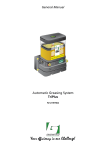

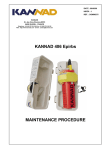


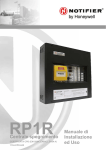
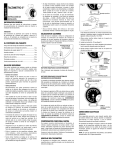
![10780-90006 - 10780A Laser Receiver for 5501A [Prefix 1948] (Mar](http://vs1.manualzilla.com/store/data/006009643_1-6e2f54ebb2199ef6df634558ba4c1bb6-150x150.png)


